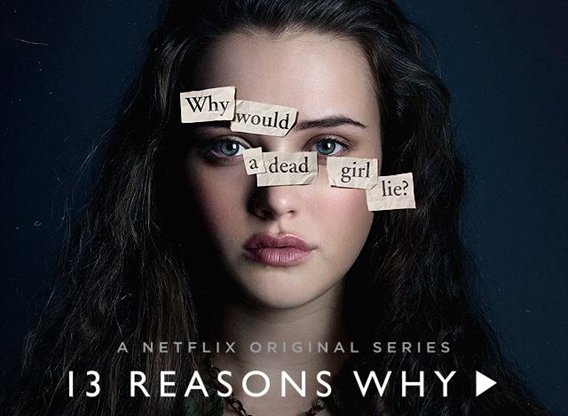When I was a teenager, I read a book called 13 Reasons Why. It made my heart ache and I sobbed through most of it because it told one of the most tragic stories imaginable through the eyes of a victim who could no longer speak for herself. It was horrifying and poignant and so awfully relatable. After I read it, the plot mostly left my mind, but the feelings I got from it hung around. I didn’t think of the book itself for years- that is, until it got picked up as a series by Netflix.
Popular stories garner attention, and attention makes money. As much as the company would like us to believe it acts out of a benevolent desire to improve the lives of its viewers and tell a vitally important story, the truth is money speaks more than any lessons television has to teach us. The series was widely anticipated, but the true attention came from the controversy surrounding the content.
13 Reasons Why is the story of Hannah Baker, who killed herself after an absolutely tragic but far-from-unique, series of events in her life. It’s the story of Clay Jensen, who loved her and was left behind. It’s the story of Bryce Walker, the serial rapist who victimized Hannah. It’s the story of Olivia Baker, the mother who has to wake up every day without her daughter. It’s a story of lives, and what happened when one ended. It’s full of raw emotions and hurt, heavy with things implied and left unsaid. Apparently, though, that works better on the page than the screen.
The television adaptation caught criticism for glorifying suicide and adult content in a show aimed at kids without proper warning. To combat these complaints, they started a website with resources and included trigger warnings before every episode and the suggestion to talk to someone about their feelings on the heavy subjects covered. It’s a nice, neat defense against criticisms that the show was irresponsible and heavy-handed. Netflix could have cut their losses and enjoyed the massive success of the show while learning from the experience. Instead, they decided to create another season based on the aftereffects of the events in the book.
Season one handled such difficult topics as depression, suicide, and sexual assault. Since there was a decent amount of uproar over the treatment of these topics, the writers apparently decided to throw every possible inflammatory topic in season two, making it into the world’s most popular after-school special. Suicide and sexual assault are still ever-present, but they added drug use and abuse, sexual dysfunction, infidelity, school shootings, and the many shortcomings of the legal system to the mix, just to spice things up.
These are incredibly important topics and deserve to be addressed in the media. Everyone consumes and relates to these ideas differently based on their own personal background and experience with the subject matter. Some people may completely approve of the way these issues were handled. I do not.
Everything doesn’t need to be tied up in a bow and have a happy ending, but it doesn’t need to be a constant horror show either. The common thread of the series is that no one gets what they deserve and the bad guys win. Some would say that that’s accurate to real life, which may be true. But the show has the main protagonists constantly battling against the absolute worst society has to offer and, try as they might, nothing goes their way. It’s a constant us vs. them where the high schoolers, victims of myriad crimes and terrible circumstances, have to take matters into their own hands in the pursuit of some sort of justice.
There are redeeming aspects of the show to be sure. The courtroom scene addressing the widespread reality of sexual violence and Clay’s speech regarding how school shootings and other tragedies are frequently treated as nothing more than talking points by those in power show how much promise the show could have. Unfortunately, those provide only short moments of truly realistic release from the overplayed drama that permeates the rest of the show. These moments are surrounded by a kind of psychological torture porn that do little else but drive home the harsh realities of the world we live in.
This isn’t truly a critique of the show itself or the people who created it. The characters are all flawed in a way recognizable to anyone who has gone through even a sliver of what they have. The issue lies with a culture where this is normalized and can in any way be entertaining. If a show like this can be looked at as a realistic portrayal of life for anyone, let alone an accurate overall representation of our culture, there are more serious issues than any novel could cover. Watch the show, read the book, it really doesn’t matter who sees it if it isn’t talked about. So don’t just watch it alone and forget it; understand it, discuss it, and try to prevent it from becoming a documentary.

